

» AQMI n’est-elle qu’une organisation terroriste ?Infoguerre.
Le COREN s'insurge contre le blanchiment des terroristes d'ANSARDINE, du MUJAO et du MNLA. BAMAKO (Xinhua) - Le Collectif des ressortissants du nord du Mali (COREN) s'insurge contre le blanchiment des terroristes, estimant qu'il est illusoire de réussir à déconnecter ANSARDINE, MUJAO et MNLA de AQMI ou AL-QAIDA car ils constituent une seule et même organisation terroriste, indique une déclaration du COREN en date du 13 novembre.
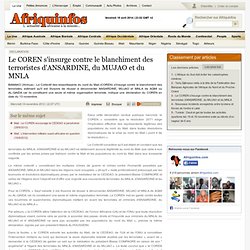
Dans cette déclaration rendue publique mercredi, le COREN « considère que la résolution 2071 exige l'implication effective des représentants légitimes des populations du nord du Mali dans toutes résolutions diplomatiques de la crise au nord du Mali ( point 4 de la résolution) ». Le Collectif considère qu'il est établi et constant que les terroristes du MNLA, d'ANSARDINE et du MUJAO ne détiennent aucune légitimité au nord du Mali que celle à eux conférée par les armes prises par trahison contre le Mali et les populations du nord du Mali dans leur écrasante majorité. Maqdisi’s Disciples in Libya and Tunisia - By Aaron Y. Zelin.
Ever since the attacks on the U.S.

Consulate in Benghazi and U.S. Embassy in Tunis in September, there has been a large spotlight on the Islamist groups viewed as the main culprits -- Katibat Ansar al-Sharia in Benghazi (ASB) and Ansar al-Sharia in Tunisia (AST). While much of the understandable focus has been on the violent actions of individuals in these organizations, much of the scope of their activities lies outside violence. A large-portion of the activities of these groups is local social service provision under their particular dawa (missionary) offices. This broader picture is crucial to better understanding emerging trends in societies transitioning from authoritarian to democratic rule. ASB and AST can broadly be considered jihadi organizations based on their ideological outlook. While many analysts view jihadism only through the prism of al Qaeda, it misses the influence of independent jihadi religious scholars. «Ils n'ont rien de musulmans»: un jihadiste nigérien quitte le Mujao au nord du Mali - Mali / Nord.
Certains gagnent le Mali pour y faire le jihad, comme le jeune Franco-Malien arrêté dimanche à Sévaré.
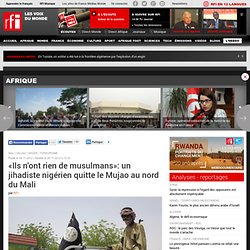
D'autres, au contraire, prennent leurs distances avec les mouvements islamistes. Ainsi, le seul Noir d'Afrique subsaharienne qui dirigeait une katiba (une brigade combattante) d'un groupe islamiste armé dans le nord du Mali, a fait défection et est rentré dans son pays d'origine, le Niger. Une information de notre correspondant à Bamako. « Bilal Hicham » est son nom de guerre.
Il ne le porte plus. C’est, en terme d’image, un coup dur pour le Mujao, le Mouvement pour l'unicité et le jihad en Afrique de l'Ouest qui contrôle la région de Gao. Nous l’avions rencontré à Gao, il y a quelques mois lors d’un reportage. Aujourd’hui de retour à Niamey, cet agronome de formation, est une mine d’informations. Al-Shabaab. Introduction Al-Shabab, or “the Youth,” is an al-Qaeda-linked militant group and U.S.
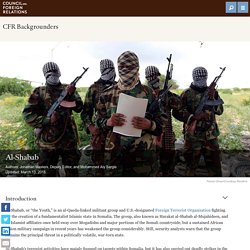
-designated Foreign Terrorist Organization fighting for the creation of a fundamentalist Islamic state in Somalia. The group, also known as Harakat al-Shabab al-Mujahideen, and its Islamist affiliates once held sway over Mogadishu and major portions of the Somali countryside, but a sustained African Union military campaign in recent years has weakened the group considerably. Still, security analysts warn that the group remains the principal threat in a politically volatile, war-torn state. Boko Haram. Introduction Boko Haram, an Islamist militant group, has attacked Nigeria's police and army, politicians, schools, religious buildings, public institutions, and civilians with increasing regularity since 2009.
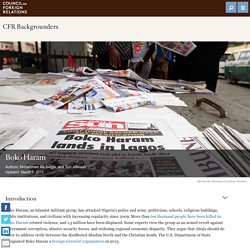
More than ten thousand people have been killed in Boko Haram-related violence, and 1.5 million have been displaced. Some experts view the group as an armed revolt against government corruption, abusive security forces, and widening regional economic disparity. They argue that Abuja should do more to address strife between the disaffected Muslim North and the Christian South. The U.S. Boko Haram's brutal campaign includes a suicide attack on a United Nations building in Abuja in 2011, repeated attacks that have killed dozens of students, the burning of villages, ties to regional terror groups, and the abduction of more than two hundred schoolgirls in April 2014. Boko Haram. Boko Haram ("Western education is forbidden"), officially called Jama'atu Ahlis Sunna Lidda'Awati Wal-Jihad (People Committed to the Prophet's Teachings for Propagation and Jihad), is a militant Islamist movement based in northeast Nigeria.
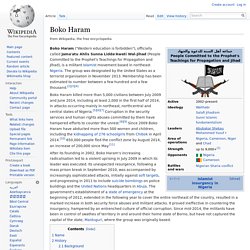
The group was designated by the United States as a terrorist organisation in November 2013. Membership has been estimated to number between a few hundred and a few thousand.[2][3][4] After its founding in 2002, Boko Haram's increasing radicalisation led to a violent uprising in July 2009 in which its leader was executed. Its unexpected resurgence, following a mass prison break in September 2010, was accompanied by increasingly sophisticated attacks, initially against soft targets, and progressing in 2011 to include suicide bombings on police buildings and the United Nations headquarters in Abuja.
Name[edit] The official name is جماعة أهل السنة للدعوة والجهاد Jama'atu Ahlis Sunna Lidda'Awati Wal-Jihad, a.k.a. History[edit] Al-Shabaab (militant group) Ansar al-Sharia (Libya) Ansar al-Sharia (English: Partisans of Sharia) is an Islamist militia group advocating the implementation of strict Sharia law across Libya, coming into being during the fractious Libyan Civil War.
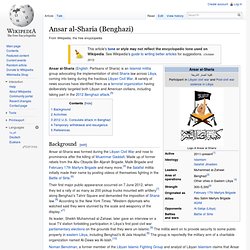
A variety of news sources have identified them as a terrorist organization having deliberately targeted both Libyan and American civilians, including taking part in the 2012 Benghazi attack.[5] Their first major public appearance occurred on 7 June 2012, when they led a rally of as many as 200 pickup trucks mounted with artillery[7] along Benghazi’s Tahrir Square and demanded the imposition of Sharia law.[8] According to the New York Times, "Western diplomats who watched said they were stunned by the scale and weaponry of the display. Ansar al-Sharia (Tunisia) Ansar al-Sharia in Tunisia is a radical Islamist group that operates in Tunisia.
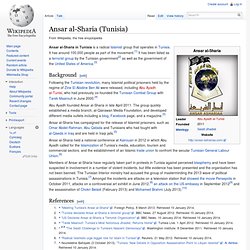
It has around 100,000 people as part of the movement.[1] It has been listed as a terrorist group by the Tunisian government[2] as well as the government of the United States of America.[3] Following the Tunisian revolution, many Islamist political prisoners held by the regime of Zine El Abidine Ben Ali were released, including Abu Ayadh al-Tunisi, who had previously co-founded the Tunisian Combat Group with Tarek Maaroufi in June 2000.[4] Ansar al-Sharia (Derna, Libya) Ansar Dine. The group is opposed to Sufi shrines.[7] Organization[edit] Membership[edit] On 24 January 2013, a faction calling itself the Islamic Movement for the Azawad split from Ansar Dine.
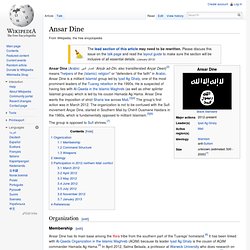
As of January 2013, this group was led by prominent Tuareg leader Alghabass Ag Intalla.[12][13] Movement for Oneness and Jihad in West Africa. History[edit] The Movement for Oneness and Jihad in West Africa (MOJWA) broke with Al-Qaeda in the Islamic Maghreb (AQIM) in mid-2011 with the alleged goal of spreading jihad further into areas of West Africa that were not within the scope of AQIM.
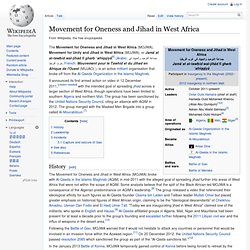
Some analysts believe that the split of the Black African-led MOJWA is a consequence of the Algerian predominance on AQIM's leadership.[8] The group released a video that referenced their ideological affinity for such figures as Al-Qaeda founder Osama bin Laden and Taliban leader Mullah Omar but placed greater emphasis on historical figures of West African origin, claiming to be the "ideological descendants" of Cheikhou Amadou, Usman Dan Fodio and El Hadj Umar Tall. In the January 2013 Battle of Konna, MOJWA temporarily gained control of Konna before being forced to retreat by the Malian army and its allied French armed forces.
Al-Qaeda in the Islamic Maghreb. The group has declared its intention to attack European, Spanish, French, and American targets. It has been designated as a Foreign Terrorist Organization by the U.S. Department of State, and similarly classed as a terrorist organization by the European Union. AQIM has focused on kidnap for ransom as a means of raising funds and is estimated to have raised more than $50 million in the last decade.[9] In December 2012, one of AQIM's top commanders, Mokhtar Belmokhtar, split off from AQIM and took his fighters with him, executing the In Amenas attack in Algeria weeks later, just after France launched Operation Serval in Mali.
« Can you hear the drums, Fernando? » (« Fernando », ABBA) Disparus en Algérie - Revue de Presse. Al-Qaeda in the Islamic Maghreb (AQIM)